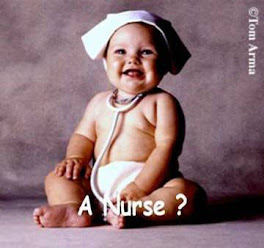Monday, November 23, 2009
Seeing the big picture.....at the end of life.
As a student, learning in the Hem/Onc/BMT unit has been a positive experience primarily because we care for the same patients over a longer term. In many case, patients are in for new diagnosis, post operative, and/or being stabilized towards going home, the outpatient setting, or they are inpatient due to relapse and now our goal is to help them transition toward death.
I've had several opportunities to work with patients who are new to their cancer treatments and those who are at the end of life. Perhaps the most difficult case I've had over the last two weeks is a female patient with Ovarian cancer/mets throughout, whose spouse is in the worst case of denial I've ever witnessed. The patient has intractable pain, unable to tolerate any intervention including sips of water or touching her, and the poor spouse is thinking the next ABX or blood transfusion is going to be the magic bullet. I know how hope and faith serve in rescuing our loved ones in crisis, but this patient had already crossed those turning points. Her body was fighting every intervention and was shutting down in violent opposition.
This has been going on for months...with the last month being the most painful: 3+ pitting edema, an abdomen 10X it's normal size, full of cancer. While I was changing and packing her open abdominal wound yesterday, I told her that she needed to get him ready and tell him what she wanted (she wants hospice..he wants her to eat and gets mad at her for not eating. He wants PT to work with her and she is no longer able to bear weight on her joints and cannot tolerate being elevated or turned in bed.) She cries that he doesn't listen and refuses to talk about it. I told her that it is difficult for him to let go, and she needs to help him.
The situation is like a big elephant in the room everyone refuses to acknowledge. She doesn't want anyone touching her due to her intractable pain, but yet, she is a full code, meaning that when her BP, heart rate and respirations slow down or cease, our response is to intervene with full force, including but not limited to CPR, chest cracking/opening/manual massage, mechanical ventilation, vasopressors, fluid resusciation etc.)
Nursing is struggling with this particular patient because medicine has been slow to address it with the spouse. Social work is waiting for nursing and nursing is waiting for medicine and this patient potentially could code any hour and the husband is still thinking his wife is going to beat the end stage diagnosis/prognosis.
Yesterday, the chaplain came by and wanted to know how she was doing. After reviewing the case with him, he took the husband aside and asked him to consider making his wife a no code, explaining what a full code would look like. A body FULL of cancer that has intractable pain should not be cracked open, compressed and pushed full of more fluids. The amount of intervention in a full code would be agonizing for the dying patient. I also talked to the patient about the importance of getting her husband ready...telling him, even though it would be hard for him to hear it, that she wanted to die, that she was ready to die. The body goes through the shutting down process and she has already started that process.
Death is the big elephant in the room that nursing in concert with medicine and psych-social, needs to acknowledge in unison, in order that we might more effectively guide our patients toward the end of their life in a manner that promotes for their optimal comfort, preserves their dignity and assists their loved ones in their grief toward acceptance.
PS: I got a call from my preceptor today that this patient passed away last night, just a few hours after her code status was changed from full to DNR. I was grateful to hear that she passed away peacefully in her sleep, which was the last thing she said to me, "please...let me sleep".
Subscribe to:
Post Comments (Atom)








1 comment:
Oh Tammy, you are a saint to be able to do this work.
Post a Comment